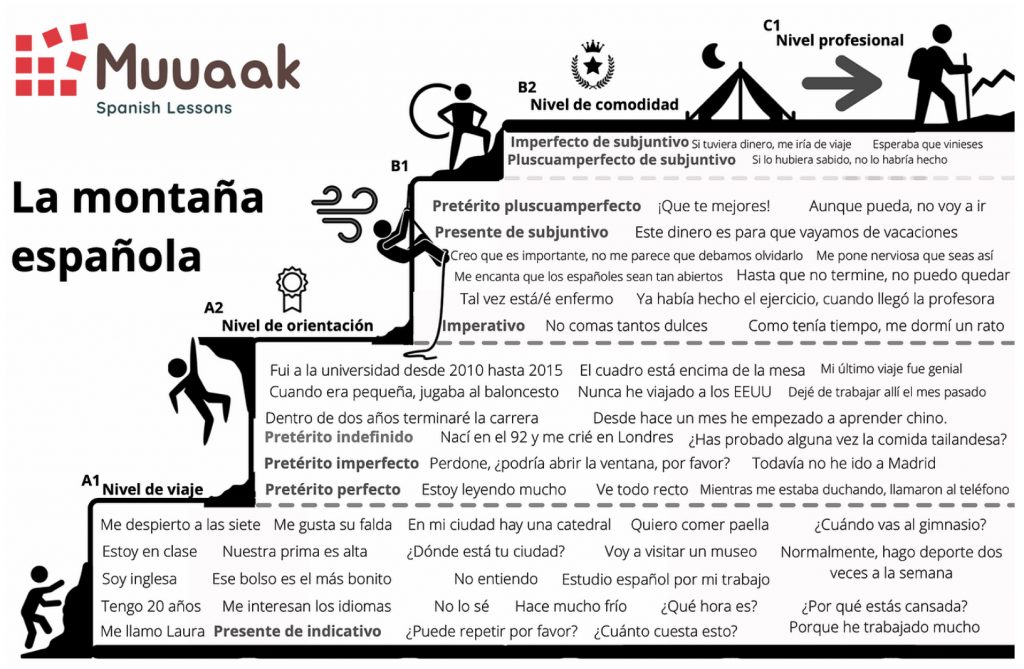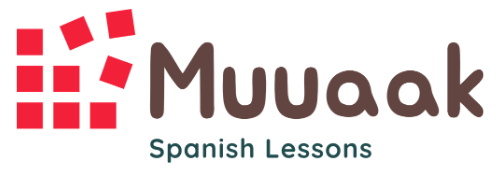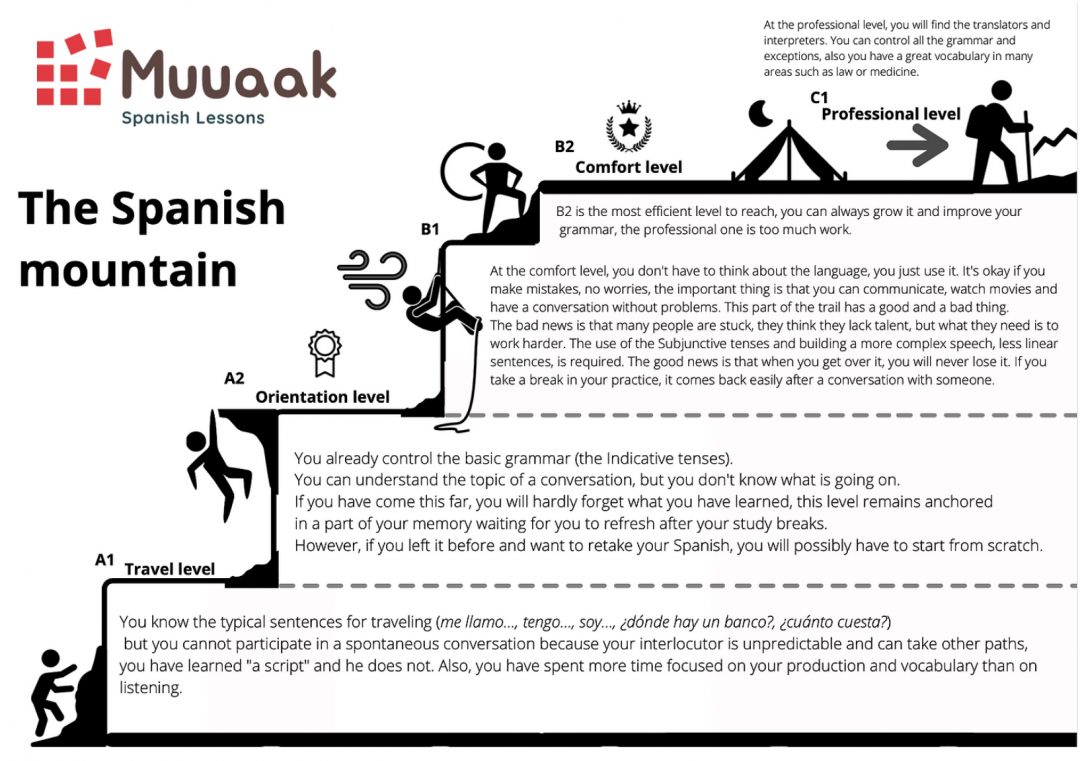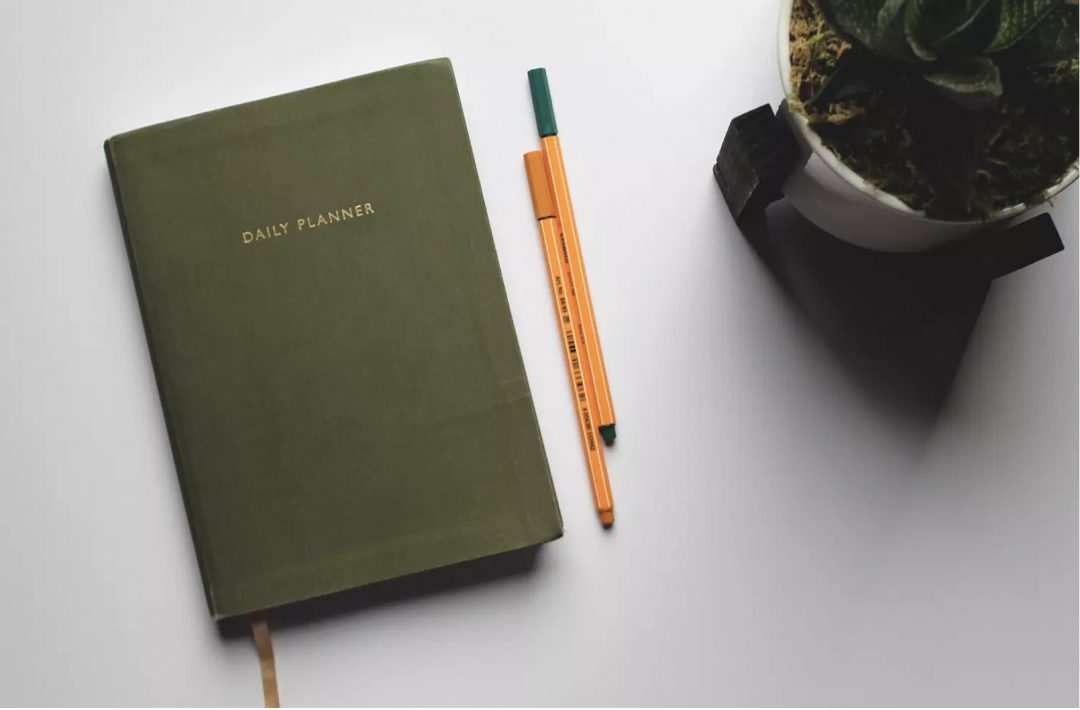In the previous post we saw that visualizing the Spanish learning path with its different stages is essential. Now, you know that it is important to reach the orientation level (second) to fix in your memory “the basics”, that at the comfort level (third) you are already quite competent in Spanish, even if you make some mistakes, and that the professional level (fourth) is too technical and unprofitable if your only goal is to engage in everyday conversations.
We are going to see The Spanish Mountain again from the grammatical approach so that, in a general way, you can see the structural complexity of each level:

You can test you, ask yourself if you understand these phrases, if they are part of your mental list of frequent use in Spanish, if you know the verb tenses of each level and if you would know when to use them. This mountain can help you know where you are on the way, in terms of formal study (the study of grammar). Perhaps you understand all the sentences and have a high level of reading skills, but in your oral, you are not able to produce sentences with “subjuntivo” or you lack vocabulary. Each student is a different case according to her learning context, so it is necessary to make an evaluation of all the skills to make a correct estimation of his/her level. However, in order to organize your grammar study, this guide can help you get an idea about the “famous topics” of each stage.
Well, you already have two journey maps, this one and the one from the previous post… So what do you need to start? What were you planning to carry in your backpack?
I hope you didn’t say “nothing”! It is very important that you grasp these five things:
1. A notebook
Write. We spend all day glued to screens, do a not digital activity and experience the pleasant sensation of creating your notebook or “logbook” (as sailors say) personalized with your own sections and color code. Research bullet journal or Japanese techniques to organize your annotations.
Pick a notebook with a cover that you think is pretty or that inspires you to have it around. By writing the information on your own “passes through you,” this transmission experience helps to fix the knowledge better on your memory. If the vocabulary list that the teacher has pointed out to you does not “pass through you” to reach your notebook, it remains on the blackboard or screen of the class and it is forgotten. Keeping your own grammar and vocabulary log is an active learning. We must assume that our work of memorization is an essential part of learning, no student is free from memorizing, but it is easier if “there is an emotion”, “a spark”, something that moves us inside at the study process. The teacher should give it to us, but you also have to look for it by personalizing your learning time and taking care of small things, like your notebook.
2. Your motivation
You need a personal connection with Spanish, for example, a native friend, a job you want to get, a trip, plans to live in a Spanish-speaking country, a desire to access information of interest to you in Spanish on the internet … Think of a plane ticket, it will make your classes less boring because you will be preparing for your adventure. But if you start studying because others say you should or just because it is trendy, your motivation will drop in a few weeks. Therefore, think of a good initial motivation and write it on the first page of your notebook, you will need it to start with eagerness.
On the other hand, it is also a good resource to convince your partner or a friend to learn together, so make the learning process less lonely. Just like when you go to the gym, accompanied is always better to motivate each other. Did you know about our IN PAIRS private lessons?
Then, as soon as you start, you will discover the evolution motivation, nothing will propel you so much forward as talking. Don’t hide your head in the book, speak from the beginning. When faced with having conversations, you increase your fluency. Feeling that you can understand each other makes you advance a lot.
For this reason, at Muuaak we offer one-to-one private lessons, so that you can focus on talking from the first day with a native teacher about your life and interesting topics for you.
3. Your patience
You are going to need it, because sometimes you fall apart when discovering unexpected complexities of the language and there are those who almost have a panic attack (it happens to students who get too frustrated for not understanding), but when time passes you will laugh at that moment. You have already seen that learning a language is like climbing a mountain. The challenges are in your head, what now seems big and difficult to you, will seem smaller and more handled when you have understood it, explored it and see it from a bird’s eye view as a landscape in your mind.
When difficulties come, it is important not to give up, to continue day by day and to know that you do not need to know everything now. If you keep in contact with the language, the most difficult vocabulary and grammatical aspects will naturally be settled into the proper context on your mental list of Spanish constructions.
4. A study schedule
Create your moment to study and commit yourself weekly or daily to get into a habit.
“I just don’t have time …”, because maybe you have to re-evaluate your priorities?
Take your schedule and make some kind of modification to find the time for your Spanish and write it down in your notebook and planner, what if you change a gym day for sport at home to get more study time? If it is possible for you, the morning is a good time, before starting your day because it will help you boost your brain power.
Remember that you should plan three moments:
1. Formal study to memorize grammar and vocabulary with your notebook.
2. Relaxed contact, to watch a series, read online, listen to a podcast, watch videos, etc.
3. Private lessons with a native, to focus on your speaking.
5. A good attitude
The ability to learn a foreign language is not a question of talent, we have all been able to learn our mother tongue, right? The habit and discipline when you get in contact with the language will allow your brain to create a mental list of constructions in Spanish in a natural way. So once you assume that there are no magic wands to learn or humans with linguistic superpowers, analyze your attitude because with laziness or fear you will not get very far.
The most advanced students (with greater fluency and less insecurities) tend to be optimistic and affectionate with their process, they avoid comparisons with other students or natives. They celebrate each small victory (such as “today I understood the teacher at the second repetition and not the fourth”, “today I completed my vocabulary study”, “before I did not use this word, now I always use it”) and the most important thing , they relax.
Remember: You have to enjoy the process, thinking only about your destination will not keep you in your way and habit.
Information adapted from Language Mentoring by (PhD) Lýdia Machová.





